Implement Rain Water Harvesting Technology for Domestic and Home Gardening Water Needs in Tsunami Affected Districts of the Southern and Eastern Province of Sri Lanka
| Project Area | Habaraduwa (Galle District); Weligama (Matara District); Pottuvil (Ampara District) |
| Duration | January 2008 - March 2009 (Completed) |
| Funded by | CIDA |
| Project goal | Increased income, food supply, and nutrition in tsunami affected homes through home gardens and water management. |
Activities
| Activity | Details | Results (As at Project Completion) | |
|---|---|---|---|
| 1 | Conduct a baseline survey of the identified locations in the 3 districts | To collect information on present agro-socio-economic situation of the project areas, Select farmers for establishing agriculture centers, Identify the skills and capabilities of relevant officials for training, identify saline contaminated wells for construction of recharging systems. | The survey was conducted of households with RWH tanks to obtain information on social and economic status. 167 households in Galle, 210 households in Matara and 235 households in Ampara district were surveyed. In addition, general information of GN divisions were collected. The survey team observed and selected 22 contaminated wells in Habaraduwa and Weligama and 11 in Potuvil and Ampara. |
| 2 | Training of farmers selected | Farmers selected will be trained on establishment of agriculture centers. | Two training and awareness programmes were conducted for 16 nursery farmers in Weligama, Habaraduwa & Pottuvil. The areas covered included nursery management, drip irrigation techniques, budding and grafting, book keeping and on pest and disease management. Training on nursery management was conducted by Agriculture Instruction officers. Training on Drip Irrigation methods was conducted by experts from Rajarata University. |
| 3 | Establishment of agricultural (Nursery) centers | 16 agriculture centers equip with planting materials will be establishes in the 3 districts. | 16 nursery centers were established ( in each selected GN division) and maintained properly. There are 6 nursery centers in Matara, 5 in Galle and 5 in Pottuvil. Each nursery farmer was given a net house, a store house, a set of necessary tools, agro-chemicals and planting materials. All planting material, seeds in nursery centers are prepared to a standards set by LRWHF. The prices of seedlings are decided by LRWHF and given with subsidiary rates for society members of the households. 50% of the price of every item sold by the nursery centers will be collected to set up an endowment fund for the societies. A name board was also established in each nursery center. The average income per annum per nursery farmer is Rs. 11,200/=. This shows the sustainability of marketing channel of nurseries, while major customers of nursery farmers were project beneficiaries. More than 36.5% beneficiaries of whole project areas bought their planting material only from 16 nursery centers established by the project. |
| 4 | Awareness programs | In each selected GND, awareness programs will be conducted to introduce the technologies and practices to beneficiaries. | Several awareness programmes were conducted in each village for the beneficiaries to introduce the concept and technology of home gardening and water conservation methods. Beneficiaries from the southern districts were taken to visit a model home garden center at Battaththa. |
| 5 | Setting up of committees | Home gardening committees will be set up in each GND | Home gardening societies were formed in each GN Division and Committees were appointed which consists of a chairman, the secretary and the treasurer. There are 11 societies consisting of a committee in Galle and Matara and 5 in Ampara districts. |
| 6 | Establishing of Home Gardens and Training of households | Households in each committee will be trained on planting, soil conservation, water conservation through use of drip irrigation kits and other methods. | 612 home gardens were set up in the 3 districts as 167 in Galle, 210 in Matara and 235 in Pottuvil. Several seedlings of perennial plants (Banana, pomegranate, guava and Ambarella) and a set of home gardening tools were given to the members of those societies. Plant materials and seed were sold to committee members with subsidiary rates by nursery centers. Beneficiaries were trained on home gardening practices, compost preparation and pest and disease management by experts of universities and Department of Agriculture. Nearly 73% of beneficiaries of whole project areas had earned or saved more than Rs. 500/= per month from selling their excess home garden products after fulfilling the family food requirements or reduced spending on fruits and vegetables by using the product from their home garden. More than 90% of beneficiaries had used fresh vegetables and fruits produced from their home gardens thus providing a better nutrition level for their family. Compost was used as fertilizer by 75.5% beneficiaries and 42% beneficiaries used organic pesticides like garlic mixture, neem mixture, soap water solution and ash solution. The main cause for higher usage of compost and organic pesticides is the higher effectiveness of training and awareness program of the project. |
| 7 | Networking | The project will be implemented with the assistance and collaboration of National Water Supply and Drainage Board (NWS&DB) Department of Agriculture, University of Rajarata and Ruhuna with Agrarian Service Centers, Samurdhi Niyamakas and other relevant government representatives in the area. | Relevant officials in the area such as NWS&DB staff, Agriculture Department and Divisional Secretaries of the area as well as other organizations working in the area are kept informed of the activities of the project. These officials participated in some site visits, programs and ceremonies of the project to encourage beneficiaries. |
| 8 | Training of officials | Training will be given on areas of identified gaps to build the skills and capacities of relevant staff in these institutes. | Officials of the Department of Agriculture in the Southern districts were trained. |
| 9 | Construction of recharging system | A suitable recharging system will be constructed near each well with the assistance of nearby households. | Recharging systems were installed for 30 private wells in both Galle and Matara districts and 4 common wells in Weligama, Denuwala and Pelena. 20 recharging systems were installed for private wells in Pottuvil. |
| 10 | Research on low cost rain water harvesting tanks | Several low cost rain water harvesting tanks models will be pilot tested to be introduced to households which does not have a rain water harvesting tank. | Designs were being identified and implemented. |
| 11 | Monitoring and evaluation | Project will be monitored closely through the network of collaborators and internally through monthly staff meeting. | Monthly monitoring meeting and site visits were conducted with project staff to discuss issues and progress of project activities. Progress of each nursery center and their issues while cultivating especially regarding the pest and disease problems was monitored and discussed by an Agriculture Instructor every month. Each home gardens and nursery centers were monitored regularly at the end of the project. The wells which connected to recharging systems were motored daily on water quality and quantity parameter. A competition was held among beneficiaries to select the best home gardens in each GN divisions of Galle, Matara and Potuvil districts. 3 home gardens were selected in each GN division by judging team according to a set of criteria. Also 3 nursery centers were selected in southern area and 2 were selected in eastern area. Prizes and certificates were distributed. See below section for a list of winners. |
Photo Gallery
| Nursery management training for Weligama & Habaraduwa nursery farmers | Drip irrigation demonstration for nursery farmers – Weligama |
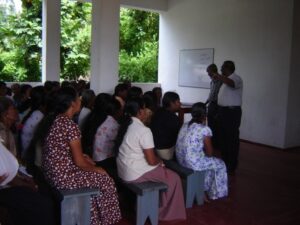 Household training at Weligama | 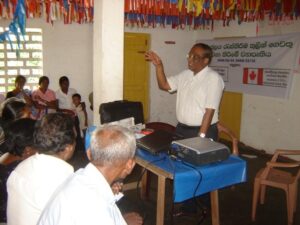 Household training at Habaraduwa |
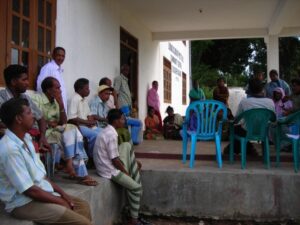 Household training at Sengama | 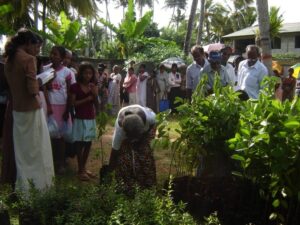 Plants distribution at Weligama |
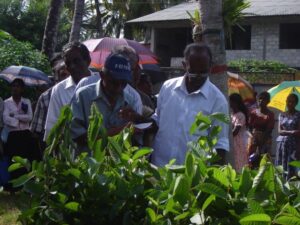 During plants distribution at Weligama | 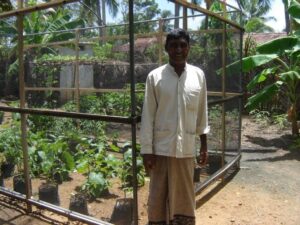 Nursery centre owner at Singhadeewaragama |
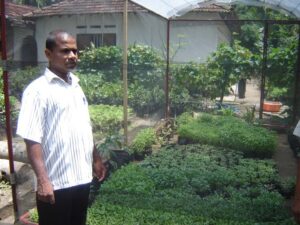 Nursery centre at Adunkele | 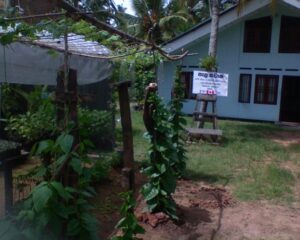 Nursery centre at Pelena south |
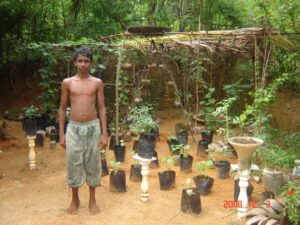 Home Garden – Pelena South | 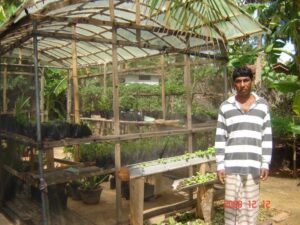 Nursery center – Ahangama, Korahedigoda |
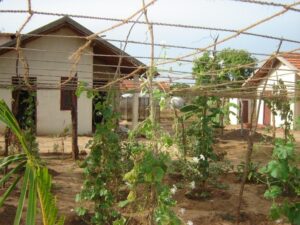 Home Garden – Komari | 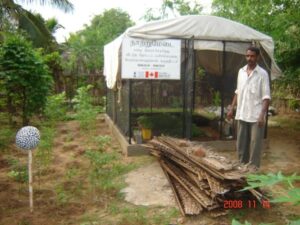 Nursery center at Komari |
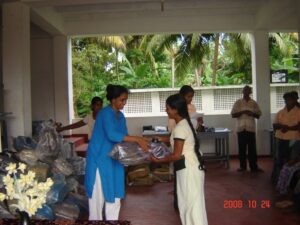 Awards presented for the winners of home garden competition | 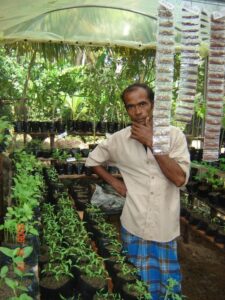 A nursery which won in the competition |
Awards presented for the winners of home garden competition |
Annex I – Best Home Garden and Nursery Competition (2008)
| Competition | Southern Province | Eastern Province |
|---|---|---|
| Nursery Competition | 1. L. B. Dayalatha - Koggala, Habaraduwa 2. C. S. Jayasekara - Midigama, Ahanagama 3. J. Wajira Chinthaka - Denuwela | 1. M. A. A. Azees - Hithayapuram 2. M. A. Rahem - Sengamuwa |
| Home Garden Competition | Midigama GN Division 1. J.V. Jayarathna 2. D.T.L. Gunawardana 3. B.G. Sunil Shantha Denuwela GN Division 1. I..J. Jayawardena 2. R.R. Hettihewa 3. M.B. Thilakarathna Pelena (South) GN Division 1. P.G. Nomis 2. E.S.P. Karunarathna 3. Athula Nishantha Sinhadeewaragama GN Division 1. D.B. Mathupala 2. Saman Priyankara 3. B.L. Pathmasiri Addunkele GN Division 1. H.W.T. Wasantha 2. L.G.H. Chandrasiri 3. L.N. Kumara Gurubabila GN Division 1. Wasantha Namali 2. Ramya Dayawansa Koggala GN Division 1. S. Jayawickrama 2. M.K. Sirisena 3. H.P. Chandrasena Pelena (North) GN Division 1. Agampodi Upul 2. P.D. Magilin 3. R.B. Dayarathna Goviyapana GN Division 1. L.H. Upali 2. R.K. Nihal 3. P.G. Sumanapala Sumithurugama GN Division 1. P.A. Chandrani 2. R.K. Edman 3. Shelton Gunwardena 4. P.W. Sanath Deshapriya | Sengamuwa GN Division 1. Sulaiman Mohomed Kasem 2. Ismail Pathummah 3. Kathar Mohideen Abdul Karder Komari GN Division 1. S. Saroginidevi 2. P. Sellaiya 3. S. Subajini Kundumadu/ Hithayapuram 1. N. Chandra 2. S. Sinnapillai 3. K. Sathummah |
